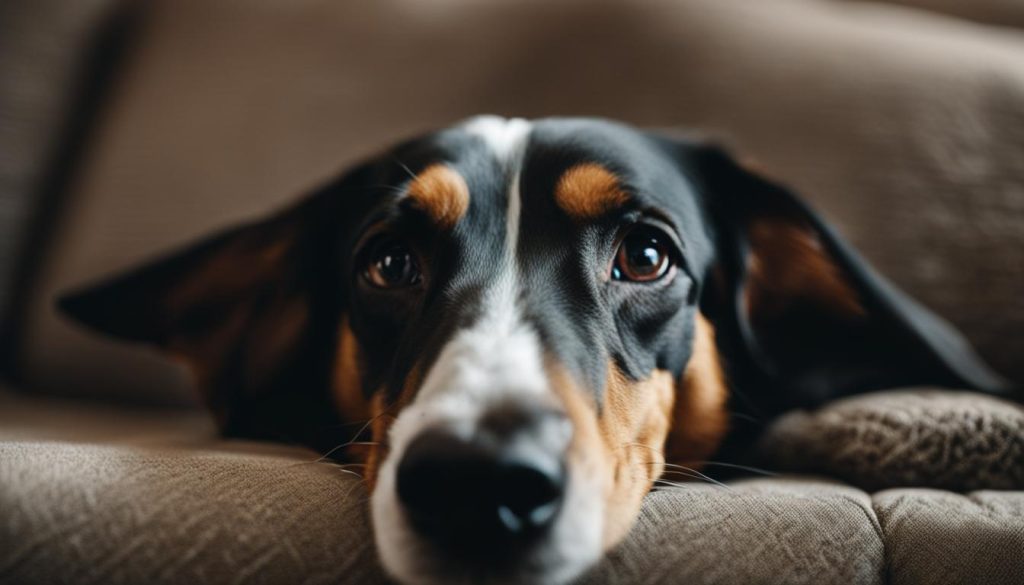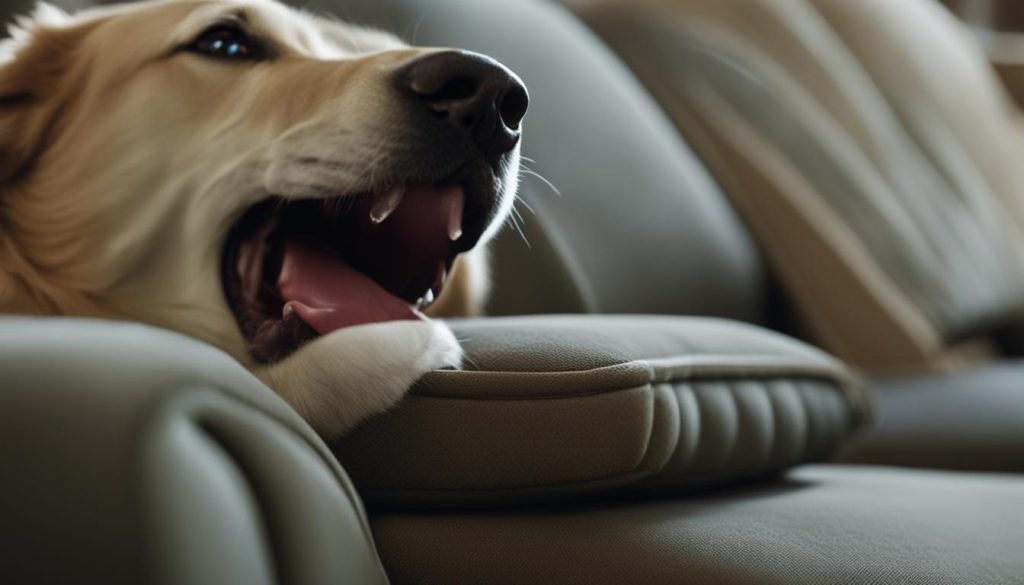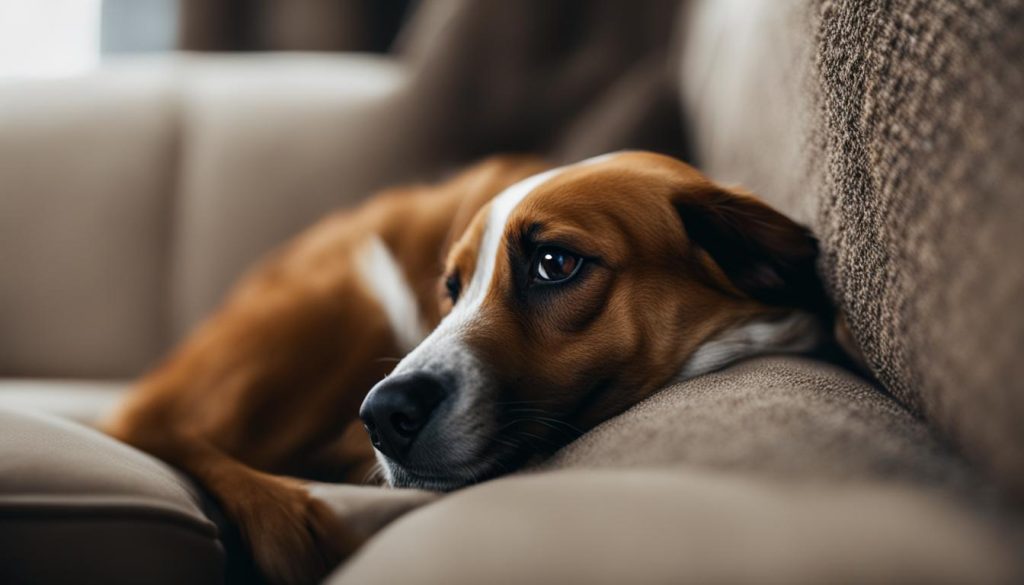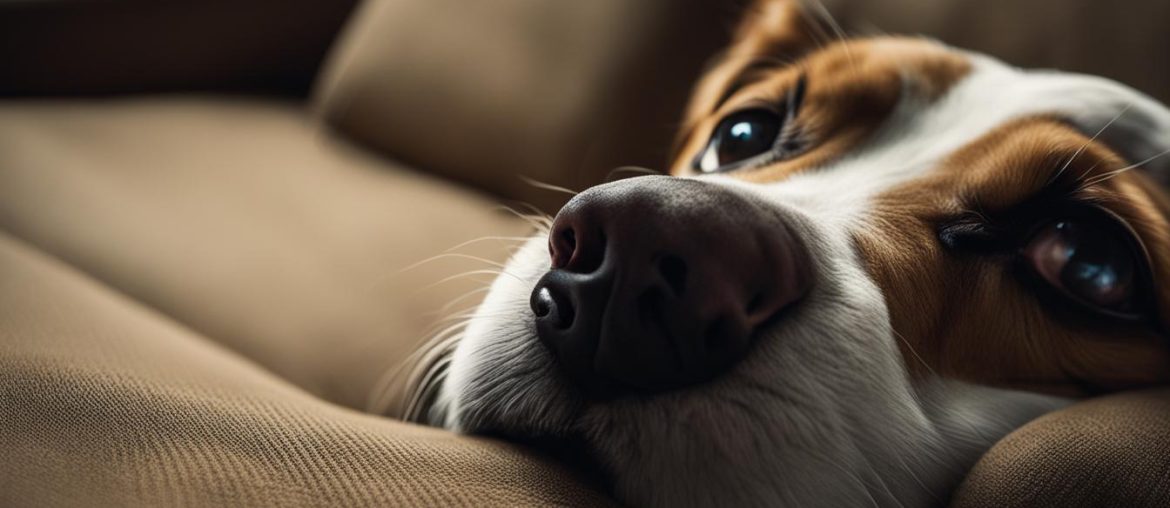As a dog owner, you may have wondered why your furry friend licks the couch. This seemingly odd behavior can have various reasons, from normal to underlying health issues. Understanding the motivations behind your dog’s couch-licking habit is essential for addressing it effectively.
Some dogs lick the couch out of boredom, seeking stimulation or attention. Others may be licking due to stress or anxiety, while some dogs may have developed an obsessive-compulsive disorder (OCD) that manifests as compulsive licking of furniture. Additionally, health issues such as digestive problems or dental pain can also lead to excessive licking behavior.
By identifying the root cause of your dog’s couch licking, you can take appropriate steps to help them overcome it. Whether it’s providing more mental and physical stimulation, addressing stress triggers, seeking veterinary advice, or implementing behavior modification techniques, there are ways to manage and stop your dog from licking the couch.
In this article, we will delve deeper into the reasons behind dog licking behavior, explore potential solutions, and provide practical tips for preventing and addressing this common issue.
Key Takeaways:
- Dogs may lick the couch due to boredom, stress, OCD, or health issues.
- Excessive and persistent licking can signal an underlying problem and should be addressed.
- Providing mental and physical stimulation can help alleviate boredom-related licking.
- Identifying and addressing stressors can reduce couch licking due to anxiety.
- OCD-related couch licking may require medication and behavior modification.
Dogs Licking Furniture Because They’re Bored

When it comes to dog licking couch behavior, boredom can be a key factor. Dogs, just like humans, need mental and physical stimulation to stay happy and engaged. If they lack proper stimulation and interaction, they may resort to licking furniture as a way to pass the time and alleviate their boredom.
One way to address this issue is by providing your dog with plenty of toys, games, and treats. These distractions can help redirect their attention away from the couch and onto more appropriate outlets for their energy. Interactive puzzle toys, chew toys, and treat-dispensing toys can be particularly effective in keeping dogs entertained.
In addition to toys, it’s important to ensure that your dog is getting enough exercise. Regular walks, play sessions, and other physical activities can help burn off excess energy and reduce boredom-related behaviors, including couch licking.
Stimulating your dog’s mind is equally important. Incorporate mental exercises into their routine, such as obedience training, puzzle games, or hiding treats for them to find. These activities can provide mental challenges and help alleviate boredom.
Socialization is another key aspect of a dog’s life. Dogs are social creatures and thrive on interaction with humans and other animals. Regular socialization opportunities, such as playdates with other dogs or trips to the dog park, can help combat boredom and reduce the inclination to lick the couch.
“Providing toys, games, and treats can help distract them and keep them entertained.”
How to Stop Dog From Licking Couch Due to Boredom
| Methods | Description |
|---|---|
| Provide interactive toys | Offer toys that provide mental and physical stimulation, such as puzzle toys and treat-dispensing toys. |
| Increase exercise | Ensure your dog gets enough exercise through regular walks, play sessions, and physical activities. |
| Engage in mental exercises | Incorporate obedience training, puzzle games, and hiding treats for mental stimulation. |
| Promote socialization | Arrange playdates with other dogs or trips to the dog park to provide social interaction. |
By addressing your dog’s boredom and providing them with adequate physical and mental stimulation, you can help redirect their attention from the couch and prevent excessive licking. Remember, a happy and engaged dog is less likely to resort to destructive behaviors like couch licking.
Dogs Licking Furniture Because of Stress

Dogs, just like humans, can experience stress and anxiety. When stressed, some dogs may resort to licking furniture as a coping mechanism. Changes in their environment or routine can trigger this behavior, causing them to seek comfort in the repetitive act of licking. It’s essential for dog owners to identify and address the underlying stressors to prevent excessive licking of the couch.
To help reduce stress and stop your dog from licking the couch, here are some strategies you can try:
1. Provide Adequate Exercise
Regular exercise plays a crucial role in keeping dogs mentally and physically stimulated. Engage your dog in daily activities such as walks, playtime, and interactive games to help them release energy and reduce stress levels.
2. Offer Mental Stimulation
Keeping your dog’s mind occupied can redirect their attention away from the couch. Puzzle toys, treat-dispensing toys, and training sessions can provide mental stimulation and prevent boredom, which is often linked to stress-induced licking behaviors.
3. Create a Comforting Environment
A calm and secure environment can help alleviate stress in dogs. Ensure your dog has a cozy and safe space where they can retreat to when they need to relax. Provide comfortable bedding, soothing music, and dim lighting to help create a tranquil atmosphere.
4. Consider Calming Supplements or Medication (consult a veterinarian)
In some cases, dogs may benefit from the use of calming supplements or medication to manage their stress levels. However, it’s important to consult with a veterinarian before administering any medications to ensure they are safe and appropriate for your dog’s specific needs.
5. Seek Professional Help if Needed
If your dog’s stress-induced licking behavior persists or worsens despite your efforts, consider seeking guidance from a professional dog behaviorist or trainer. They can assess the underlying causes of stress and provide tailored strategies to address the issue effectively.
By understanding the role of stress in causing dogs to lick furniture and implementing these strategies, you can help reduce stress levels and prevent excessive licking of the couch.
| Reasons for Dog Licking Couch: | Preventive Measures |
|---|---|
| Stress and anxiety | Ensure a comforting environment and provide mental stimulation |
| Boredom | Increase exercise, offer toys and games to keep them entertained |
| Obsessive-compulsive disorder (OCD) | Consider behavior modification therapy and, if necessary, consult with a veterinarian for further guidance |
| Health issues | If the licking behavior is accompanied by other signs of illness, consult a veterinarian for proper diagnosis and treatment |
Licking and Obsessive-Compulsive Disorder
Obsessive-compulsive disorder (OCD) can affect dogs, leading to compulsive behaviors such as excessive licking of furniture. Dogs with OCD may exhibit intense and difficult-to-distract-from licking behaviors, including licking their paws and the couch. This condition can be caused by a combination of genetic factors, a restricted environment, or other triggers.
Managing OCD-related couch licking requires a multi-faceted approach. Anti-anxiety medications, prescribed by a veterinarian, may be used to reduce anxiety levels and compulsive behaviors. Additionally, behavior modification therapy can help redirect the dog’s attention and provide alternative outlets for their excessive licking tendencies. Identifying triggers that exacerbate the compulsive licking and providing a stimulating and enriching environment can also contribute to the management of this condition.
It’s important to work closely with a veterinarian to develop a tailored treatment plan for dogs with OCD. An accurate diagnosis and comprehensive treatment approach can help minimize the negative impact of OCD-related couch licking and improve the dog’s overall well-being.
Treatment options for OCD-related couch licking
| Treatment | Description |
|---|---|
| Anti-anxiety medication | Prescribed by a veterinarian to reduce anxiety levels and compulsive behaviors. |
| Behavior modification therapy | Helps redirect the dog’s attention and provides alternative outlets for excessive licking tendencies. |
| Identifying triggers | By understanding the triggers that exacerbate the compulsive licking, owners can take steps to minimize their impact. |
| Stimulating environment | Providing mental and physical stimulation can help distract the dog from couch licking and promote better overall well-being. |
Licking Furniture Because of Health Issues

Excessive licking of furniture can be a common behavior in dogs, but it can also be a symptom of underlying health issues. Digestive problems, stomach upset, dental pain, and cognitive dysfunction are some of the potential causes behind a dog’s compulsive licking of furniture. If you notice that your dog’s licking behavior is excessive or if it is accompanied by other signs of illness, it’s crucial to consult a veterinarian for a proper diagnosis and treatment plan.
Common Health Issues Causing Dog Licking Couch
There are various health issues that can lead to a dog’s excessive licking of furniture:
| Health Issue | Symptoms |
|---|---|
| Digestive Problems | Upset stomach, diarrhea, vomiting |
| Dental Pain | Bad breath, difficulty eating, swollen gums |
| Cognitive Dysfunction | Confusion, disorientation, changes in behavior |
| Skin Allergies | Itching, redness, hair loss |
It’s important to note that excessive licking of furniture is just one symptom of these health issues, and a proper diagnosis by a veterinarian is crucial for effective treatment.
If you suspect that your dog’s licking is due to a health issue, it is recommended to provide your veterinarian with a detailed history of the behavior, including when it started, how often it occurs, and any accompanying symptoms. This information will assist in determining the underlying cause and developing an appropriate treatment plan.
Remember, as a responsible dog owner, it is essential to prioritize your dog’s health and well-being. By addressing and treating any health issues causing the excessive licking behavior, you can improve your dog’s overall quality of life and prevent further damage to your furniture.
Figuring Out Why Your Dog is Licking Furniture

To address a dog’s excessive licking of furniture, it’s essential to determine the underlying cause. Observation and awareness of triggers can help identify if the behavior is due to boredom, stress, health issues, or other factors. Consulting a veterinarian can provide valuable insights and guidance for managing and stopping the licking behavior.
When trying to figure out why your dog is licking furniture, it’s important to consider the following factors:
- Boredom: Dogs may lick furniture when they’re bored and lack stimulation. They might be seeking attention or trying to entertain themselves. Providing interactive toys, engaging in play sessions, and introducing new activities can divert their attention away from the couch.
- Stress and anxiety: Dogs may resort to licking furniture as a coping mechanism for stress or anxiety. Changes in the environment, such as moving to a new home or the addition of a new pet, can trigger this behavior. Creating a calm and secure environment, using anxiety-reducing techniques, and providing mental enrichment can help alleviate stress-related licking.
- Health issues: Excessive licking of furniture can sometimes be a symptom of underlying health problems. It’s important to rule out any medical issues that might be causing discomfort or irritation. Dental problems, digestive issues, allergies, or skin conditions could contribute to the licking behavior. If you notice other signs of illness, consult a veterinarian for a thorough examination and appropriate treatment.
By understanding the reasons behind your dog’s licking behavior, you can take the necessary steps to address it effectively. Here is a table summarizing the common causes and possible solutions:
| Reason for Dog Licking Couch | Possible Solutions |
|---|---|
| Boredom | – Provide interactive toys – Engage in playtime – Increase physical exercise |
| Stress and Anxiety | – Create a calm environment – Use anxiety-reducing techniques – Provide mental enrichment |
| Health Issues | – Consult a veterinarian – Get a thorough examination – Treat any underlying conditions |
Remember, every dog is unique, and the reasons behind their licking behavior may vary. It’s important to observe your dog’s habits, consult with professionals, and tailor the solutions to your dog’s specific needs. By addressing the underlying cause, you can help your dog overcome excessive licking and maintain a happy and healthy environment for both of you.
Common Reasons Dogs Lick Furniture

When it comes to dogs licking furniture, there can be various reasons behind this behavior. Understanding these common reasons is crucial in effectively addressing and managing the habit of excessive couch licking.
- Boredom: Dogs may lick furniture when they are bored and lack stimulation. Providing them with appropriate toys, games, and activities can help redirect their focus and prevent them from indulging in couch licking.
- Anxiety: Anxiety and stress can also drive dogs to lick furniture. Changes in the environment or routine can trigger this behavior. Creating a calm and soothing environment, along with regular exercise and mental stimulation, can help alleviate anxiety and reduce couch licking.
- Curiosity: Dogs may lick furniture out of curiosity. Exploring new textures and tastes is a natural behavior for them. It’s important to provide alternative and safe objects for them to investigate instead of the couch.
- Attention-seeking: Some dogs may lick furniture as a way to seek attention from their owners. If they have learned that couch licking results in attention or a reaction, they may continue doing it. Ignoring the behavior and redirecting their attention to more appropriate activities can help break this habit.
- Taste: The taste of furniture may be appealing to dogs, especially if there are food residues or other tasty substances on the surface. Cleaning and removing any enticing smells or tastes can discourage couch licking.
- Stress: Dogs may resort to licking furniture when they are stressed. Identifying and addressing the underlying stressors, such as changes in the household or separation anxiety, can help alleviate the behavior.
To effectively manage and prevent excessive couch licking, it’s important to provide dogs with appropriate stimulation, engaging activities, and a calm environment. Understanding their needs and addressing any underlying causes can help redirect their behavior and promote a healthier, more enjoyable lifestyle.
| Reasons for Dog Licking Couch | How to Address the Behavior |
|---|---|
| Boredom | Provide toys, games, and mental stimulation |
| Anxiety | Create a calm environment, regular exercise, and mental stimulation |
| Curiosity | Offer alternative objects for exploration |
| Attention-seeking | Ignore the behavior and redirect their attention |
| Taste | Clean and remove enticing smells or tastes |
| Stress | Identify and address underlying stressors |
The Role of Taste and Smell

Dogs have a remarkable sense of taste and smell, which plays a significant role in their attraction to licking the couch. The fabric of the couch can carry appealing scents and tastes that capture a dog’s interest. It’s not uncommon for dogs to detect leftover food particles, the scent of their favorite human, or even the smell of other animals on the couch. These olfactory stimuli can trigger a dog’s instinctual behavior of licking.
Understanding the influence of taste and smell can help us better manage and prevent excessive licking behavior in dogs. By addressing these sensory factors, we can create an environment that discourages the habit of licking the couch.
However, it’s important to note that taste and smell are not the only factors contributing to a dog’s licking behavior. Other underlying factors such as boredom, stress, OCD, or health issues may also play a role. Therefore, a comprehensive approach involving environmental enrichment, behavioral modification, and, if necessary, veterinary support is crucial in addressing and managing the behavior effectively.
In the next section, we will explore practical steps to identify and address the diverse reasons behind a dog’s licking behavior and provide guidance on how to stop a dog from licking the couch.
Wrapping Up
Excessive licking of the couch can be a concerning behavior in dogs, indicating underlying issues such as boredom, stress, obsessive-compulsive disorder (OCD), or health problems. Understanding the reasons behind this behavior is crucial in addressing and managing it effectively. By providing appropriate stimulation, seeking veterinary guidance, and implementing behavioral modification techniques, it is possible to help your dog stop licking the couch.
For boredom-related licking, it is important to provide your dog with plenty of mental and physical stimulation. Engage them in interactive play, provide puzzle toys, and take them for regular walks and exercise. Additionally, offering chew toys and treats can redirect their attention from the couch to more appropriate objects.
If your dog is licking the couch due to stress or anxiety, creating a calm and safe environment can be helpful. Consider using pheromone sprays or diffusers, providing a cozy den-like space for your dog, and practicing relaxation techniques such as gentle massages or music therapy. In severe cases, consulting a professional dog trainer or a veterinary behaviorist may be necessary.
In instances where the licking behavior is persistent and obsessive, it is important to consult a veterinarian to rule out any underlying health issues or OCD. They can provide a proper diagnosis and recommend appropriate treatment options, which may include medication or behavior modification therapy. Always remember to monitor your dog’s well-being and seek professional guidance when needed.
FAQ
Why does my dog lick the couch?
Dogs may lick the couch due to boredom, stress, anxiety, obsessive-compulsive disorder (OCD), or health issues. Licking can be a normal behavior, but excessive and persistent licking can indicate an underlying problem.
How can I stop my dog from licking the couch?
To stop your dog from licking the couch, it is important to first determine the underlying cause. If it’s due to boredom, providing toys, games, and treats can help distract them. If it’s due to stress or anxiety, identifying and addressing the stressors can help. If the licking behavior is obsessive, it may be necessary to consult a veterinarian for proper diagnosis and treatment.
Why do dogs lick furniture when they’re bored?
Dogs may lick furniture out of boredom because they lack stimulation and interaction. Providing toys, games, and treats can help distract them and keep them entertained. Increasing exercise, mental stimulation, and socialization can also help alleviate boredom and reduce the habit of licking the couch.
How does stress contribute to dogs licking furniture?
Dogs may lick furniture as a response to stress and anxiety. Changes in the environment or routine can trigger this behavior. It’s important to identify and address the underlying stressors. Increasing exercise, offering mental stimulation, and providing a comforting environment can help reduce stress and prevent excessive licking of the couch.
Can licking furniture be a sign of obsessive-compulsive disorder (OCD) in dogs?
Yes, some dogs may develop obsessive-compulsive disorder (OCD), which can manifest as compulsive licking of furniture. This behavior is often intense and difficult to distract from. OCD can be caused by genetics, restricted environments, or other factors. Treatment options may include anti-anxiety medication and behavior modification therapy.
What are the health issues that can cause dogs to lick furniture?
Excessive licking of furniture can be a symptom of health issues in dogs. Digestive problems, stomach upset, dental pain, or cognitive dysfunction can lead to compulsive licking. If a dog’s licking behavior is accompanied by other signs of illness, it’s important to consult a veterinarian for proper diagnosis and treatment.
How do I figure out why my dog is licking the furniture?
To address a dog’s excessive licking of furniture, it’s essential to determine the underlying cause. Observation and awareness of triggers can help identify if the behavior is due to boredom, stress, health issues, or other factors. Consulting a veterinarian can provide valuable insights and guidance for managing and stopping the licking behavior.
What are the common reasons why dogs lick furniture?
Dogs may lick furniture for various reasons, including boredom, anxiety, curiosity, taste, attention-seeking, and stress. Understanding these common reasons can help in addressing the behavior. Providing appropriate stimulation, toys, exercise, and attention can redirect the dog’s focus and discourage excessive licking of the couch.
How does taste and smell affect dogs’ attraction to licking furniture?
Dogs have a strong sense of taste and smell, which can influence their attraction to licking the couch. The couch’s fabric may carry appealing scents or tastes, such as food particles or human scent. Understanding the role of taste and smell can help in managing and preventing excessive licking behavior.
What are some ways to stop my dog from licking the couch?
To stop your dog from licking the couch, it is important to determine the underlying cause first. This can include providing appropriate stimulation and distractions, addressing stress and anxiety, seeking veterinary guidance for health issues, and implementing behavioral modification techniques.






